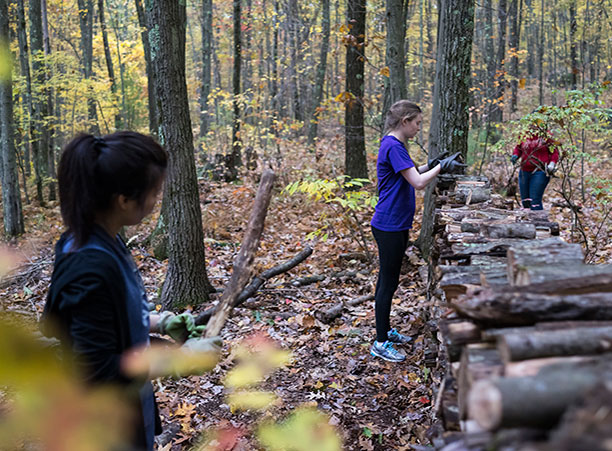 Beginning in 2010, the Chaplains’ Office at the College of the Holy Cross instituted the Fall Break Immersion Program. The program provides students with opportunities to be challenged to grow in their faith, to accompany those living on the margins, and to become more aware of broader social justice issues in their community. There are three programs located in three distinct local areas including the Agape Community in Ware, Mass., L’Arche community in Haverhill, Mass., and an immersion focused in the city of Worcester, Mass.
Beginning in 2010, the Chaplains’ Office at the College of the Holy Cross instituted the Fall Break Immersion Program. The program provides students with opportunities to be challenged to grow in their faith, to accompany those living on the margins, and to become more aware of broader social justice issues in their community. There are three programs located in three distinct local areas including the Agape Community in Ware, Mass., L’Arche community in Haverhill, Mass., and an immersion focused in the city of Worcester, Mass.
The Worcester Immersion specifically began in 2011, and it emerged from students who consistently expressed a desire to come to know Worcester more intimately. The program, designed for first-year students, offers a balanced perspective on the city and allows students to consider how they might interact with these communities while attending Holy Cross.
Six first-year students, along with two senior leaders, reside in the Concordia Lutheran Church for a full week, while also visiting various houses of worship to gain an understanding about the religious diversity of the city. The schedule includes dinners at local ethnic restaurants, visits to local parks and museums, as well as an opportunity to meet with many elected officials at City Hall. In addition, the students wake up at 6 a.m. to prepare breakfast for the local community.
“One of my favorite experiences of the trip was purchasing another barrel of goods for the church to send to Liberia. Most of the congregation at the church is from Liberia, so many people in their family have been exposed to Ebola. The church had one barrel already full, but when I saw that it was not going to fit everything, I went out and bought another. The joy on the pastor’s face was priceless,” says senior leader Sarah Paletta ’15.
Paletta led the group with fellow senior Nick Sanville ’15. The two participated in the planning of the program with the assistance of Marty Kelly, associate chaplain and director of service and social justice programs.
Another program hosted by the College is the opportunity to volunteer at the L’Arche community in Haverhill, Mass., one of 18 L’Arche communities in the United States. L’Arche is an international network of homes where people with and without intellectual disabilities share life together in a community of faith and friendship. Students have the opportunity build relationships through work, prayer, and shared celebration.
"My experience with L'Arche last year and this year has been enriching beyond belief. I have developed friends within the community in Haverhill and feel that they have taught me so much. This organization’s model, which believes everyone has a purpose and holds importance, is so unique and so heart wrenching. I would suggest to anyone to not only do an immersion program at L'Arche, but also think about applying to work with one of the L'Arche communities located throughout the world," says leader of the trip Sean MacKenzie ’15.
Lastly, students have the opportunity to join the Rural Immersion Program, hosted by the Agape Community in Ware, Mass. This is a hands-on experience that focuses on sustainable and contemplative living and includes facilitated conversations on issues including non-violence, peacemaking, and ethically informed food choices.
Anthony Yakley ‘16, leader of the group discusses his experience: “We lived simply, not relying on electronic devices and taking time for prayer and meditation. We ate vegetarian and did work, including working in a garden and collecting wood. I was able to plan the reflections and logistical aspects of the trip with the help of Colleen Melaugh, campus ministry fellow in the Chaplains' Office. She was a great resource.”
His favorite part of the trip? “Early morning yoga, which was a relaxing way to center ourselves before work,” adds Yakley.
The College of the Holy Cross offers numerous international service trips throughout the year. The experiences are rooted in prayer and reflection, and any work performed is secondary to the time spent with individuals in their environments.
Holy Cross Students Thrive in Local Communities
Fall Break Immersion Program
Read Time
3 Minutes


